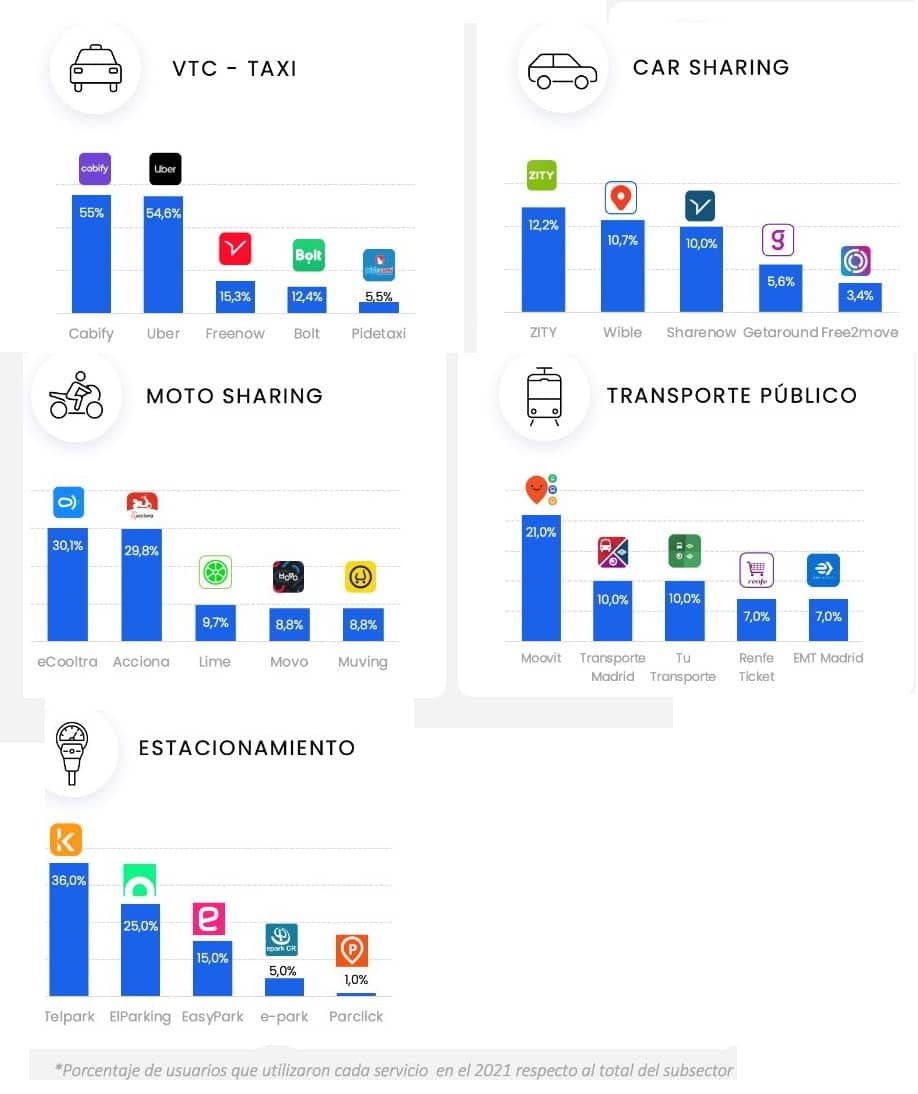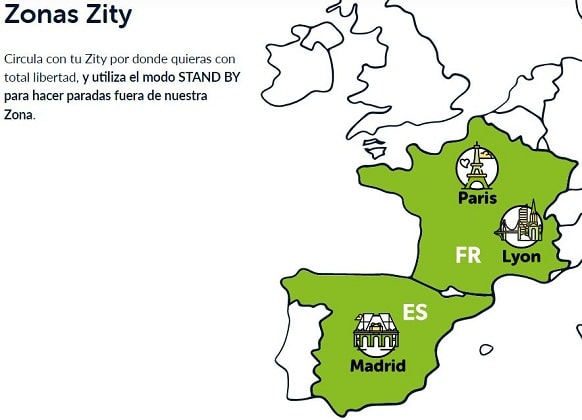
![]()
![]()
We are in a fully digital era, where most of the services, companies and businesses are handled within this online ecosystem. The transport sector is not far behind in this case, and is even one of the sectors that has shown the greatest evolution as a result of this digital integration process.
As part of its Observatory on Urban Mobility, the observational data company Smartme Analytics has released a report on the state of the sector in Spain once, after the control of the Covid-19 pandemic, the mobility market. Among the main conclusions: Cabify in the taxi and VTC sector, Ecooltra in motorcycle sharing, Zity in car sharing and Moovit in public transport are the mobility services with the largest market share in each of these mobility subsectors. The emergence of Bolt or the unstoppable growth of Zity also attract attention in a market marked by dynamism.

Cabify and Uber fight for control of the VTC market
The VTC or tourist vehicles with driver, are one of the private urban mobility formats most used today. In a general way, we could say that it is a taxi service of the new digital age in which, through applications and mobile devices, users can request, schedule, pay and even cancel their trips to travel wherever they want. . This new service format means greater comfort and accessibility for users, as they can wait for their driver to arrive, without having to actively go out on the street to look for him or have to call a taxi station. The analysis reveals that digital services for requesting traditional taxis are generally used for planned transport, with longer half-time sessions and mainly from home or through Wi-Fi connections, while VTCs have an important “on the go” component.
In this aspect, Cabify is positioned as the favorite company of the Spanish, with a penetration of 55% (measured as the percentage of users who used the service with respect to the total of the subsector). Cabify is closely followed by the American mobility giant, Uber, which maintains a strong position with 54.6% penetration. However, they are not the only participants in the VTC ecosystem; given the evolution of the sector, new agents have appeared, such as: Free Now, Pide Taxi or Bolt.
In this sense the bolt irruption in the Spanish market was striking and points to changes in the sector in the short term due to its rapid growth. This Estonian startup reached the Spanish market in July 2021 and by December it was already the third brand by market share thanks, in part, to a strategy based on significant discounts for new users.
Ecooltra and Zity dominate the sharing market with their respective services
On the other hand, a format that has also been widely adopted is car sharing or motorcycle sharing. This is simply about vehicle rental, in this case for both cars and motorcycles. This service has many facilities compared to traditional mobility, by offering rental stations throughout the city, allowing you to travel from one point to another easily, without the need to rent the vehicle for longer than necessary.
Here, Ecooltra maintains dominance of market penetration for motorcycles, with an estimated 30.1% compared to services such as Acciona, Lime or Movo. Its service makes more than 9,000 electric motorcycles available to users, maintaining a sustainable model.
On the other hand, Zity is a platform developed by the mobility software company Mobilize. This specializes in car rental, maintaining a 12.1% penetration in Spain. Like Ecooltra, it offers a sustainable service model, and given its technology, it allows for a simpler and more comfortable experience; In addition, it does not have a limit of kilometers for trips, allowing free travel between its Madrid and Paris areas.

Moovit stands out as an app for mobility management
Another of the highlights in the study is Moovit, a mobile application that allows users to locate routes and travel options within the city, based on available public transport services. In other words, it facilitates user access to the schedules, routes, times and costs of the different public transport services where they are. This can be a great relief for tourists and travelers, who do not drive the routes of the city they visit.
Based on these characteristics, a special place has been achieved within the Spanish population, with a 21% penetration in terms of public transport.
“Urban mobility is one of the social phenomena with the greatest impact on the daily life of the inhabitants of large cities. Supported by leading companies in the sector, we have created the first Urban Mobility Observatory. A service of data, knowledge and analysis of trends and the future evolution of sustainable coexistence in the main Spanish cities. After the big break caused by the confinement in terms of mobility, 2021 has been a year of recovery for the sector. That is why we have shared a first report with public data that contributes to collective knowledge”, he points out. Lola ChiconCEO and founder of Smartme Analytics.
Image: Depositphotos
Stay informed of the most relevant news on our Telegram channel




![Consumer spending on shopping apps increased 37% during Q4 2022 [AppsFlyer]](https://www.logitechgamingsoftware.co/wp-content/uploads/2023/07/imagen-2023-07-20T122224.702-336x220.jpg)
